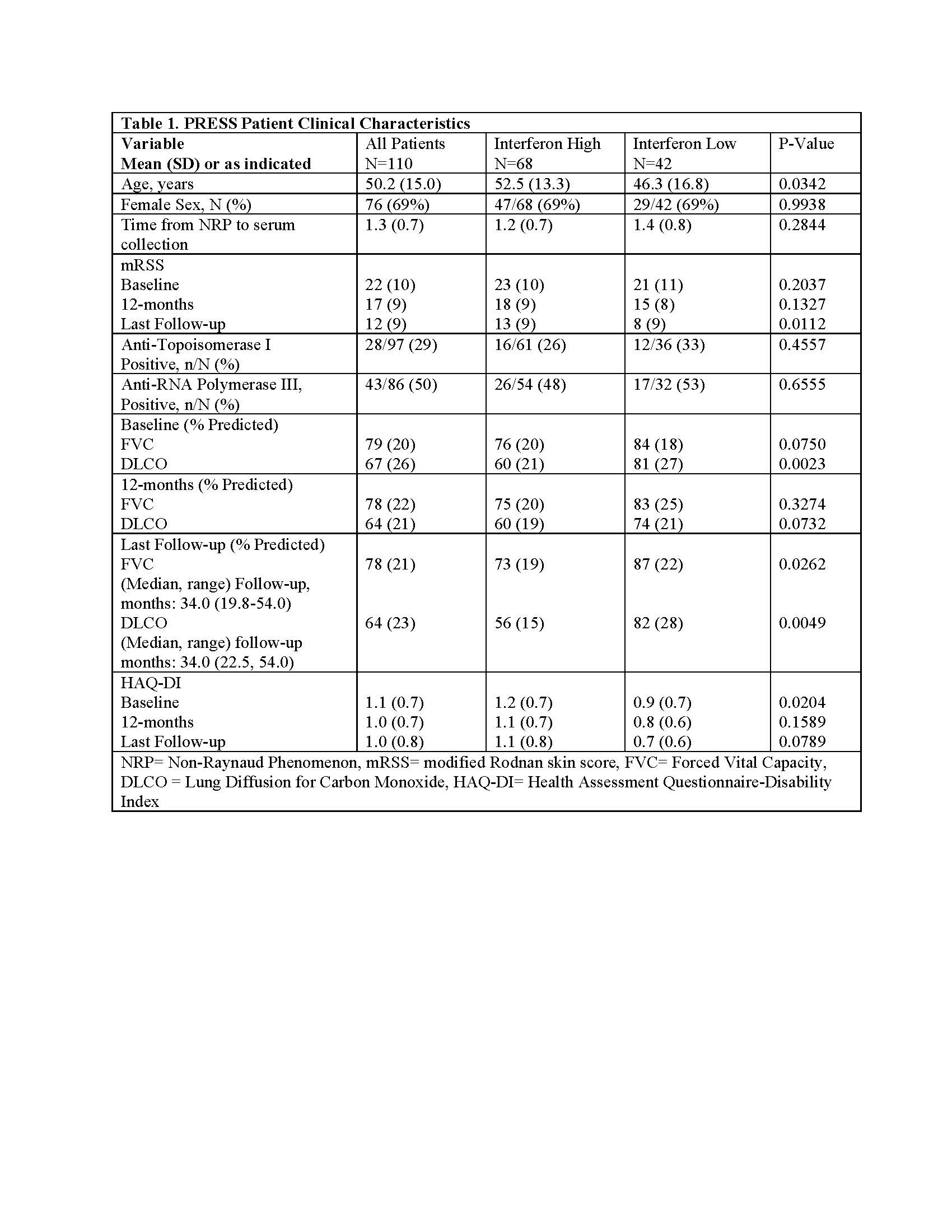Session Information
Date: Tuesday, November 9, 2021
Title: Systemic Sclerosis & Related Disorders – Clinical Poster III (1836–1861)
Session Type: Poster Session D
Session Time: 8:30AM-10:30AM
Background/Purpose: Several published studies have demonstrated activation of the interferon type 1 (IFN) pathway in sera from patients with systemic sclerosis (SSc). Specifically, levels of IFN activation correlate with severity of skin and lung fibrosis, cardiac involvement, quality of life, and measures of collagen turnover. Microarray and proteomic studies have indicated that the serum concentrations of CCL2, CCL8, CCL19, CXCL9, CXCL10, and CXCL11 significantly correlate with the IFN-induced activation of peripheral blood mononuclear cells (PBMCs). The study goal was to determine the association between the serum IFN score at baseline and longitudinal outcomes at follow-up in the Prospective Registry of Early Systemic Sclerosis (PRESS) Cohort.
Methods: We performed a retrospective cohort study of patients enrolled in the PRESS Registry at eleven sites in the US between April 2012 and January 2019. Patients had early diffuse cutaneous (dc)SSc (disease duration < 2 years from the onset of the first non-Raynaud Phenomenon SSc symptom) and fulfilled the ACR/EULAR 2013 Classification Criteria for SSc. Serum from age- and sex- matched healthy controls obtained at one academic center as well as serum from SSc patients collected at the baseline visit was subjected to Luminex xMAP technology (Myriad-Ruled Based Medicine, Austin, TX). A serum IFN score was generated for each patient by averaging the natural logarithm of the concentrations of CCL2, CCL8, CCL19, CXCL9, CXCL10, and CXCL11. Dichotomization of scores were based on Mean + 2 standard deviations (SD) of healthy control, used as cut off for normal (or IFN Low vs IFN High). We compared baseline and follow-up clinical features of patients classified as IFN High or Low according to a score greater than (IFN High) or within two SD from mean of healthy controls (IFN Low).
Results: Sera from the baseline visit were available for 110 PRESS patients who were 69% female. Patients with IFN High Scores were older and had longer SSc disease duration compared to the IFN Low Score patients (Table 1). At baseline, IFN High versus Low patients had higher mRSS (mean [SD] 23.4 [9.6] vs. 20.7 [11.3], p-value 0.2037), and lower forced vital capacity (FVC) % predicted (76.0 [20.1] vs. 84.4 [18.1], p-value 0.0750) and lung diffusion for carbon monoxide (DLCO) % predicted (59.8 [21.1] vs. 80.6 [27.3], p-value 0.0023). The Health Assessment Questionnaire-Disability Index (HAQ-DI) was also higher in the IFN High versus IFN Low patients. At last follow-up, IFN High patients maintained significantly higher mRSS and lower lung function parameters (Table 1).
Conclusion: Patients with early dcSSc enrolled in the PRESS Cohort with a IFN High Score at baseline had worse FVC and DLCO % predicted, worse mRSS and worse HAQ-DI, which they kept at last available follow up. While we could not measure treatment effects given the observational nature of this cohort, the data support the notion that serum interferon score may be a biomarker for active disease in patients with early dcSSc.
To cite this abstract in AMA style:
Hinchcliff M, Huang S, Assassi S, Bernstein E, Castelino F, Domsic R, Frech T, Gordon J, Hant F, Shah A, Shanmugam V, Steen V, Khanna D, Del Galdo F. Serum Interferon Score Is a Biomarker of Active Disease in Patients with Early Diffuse Cutaneous Systemic Sclerosis Enrolled in the Prospective Registry of Early Systemic Sclerosis (PRESS) Cohort [abstract]. Arthritis Rheumatol. 2021; 73 (suppl 9). https://acrabstracts.org/abstract/serum-interferon-score-is-a-biomarker-of-active-disease-in-patients-with-early-diffuse-cutaneous-systemic-sclerosis-enrolled-in-the-prospective-registry-of-early-systemic-sclerosis-press-cohort/. Accessed .« Back to ACR Convergence 2021
ACR Meeting Abstracts - https://acrabstracts.org/abstract/serum-interferon-score-is-a-biomarker-of-active-disease-in-patients-with-early-diffuse-cutaneous-systemic-sclerosis-enrolled-in-the-prospective-registry-of-early-systemic-sclerosis-press-cohort/

